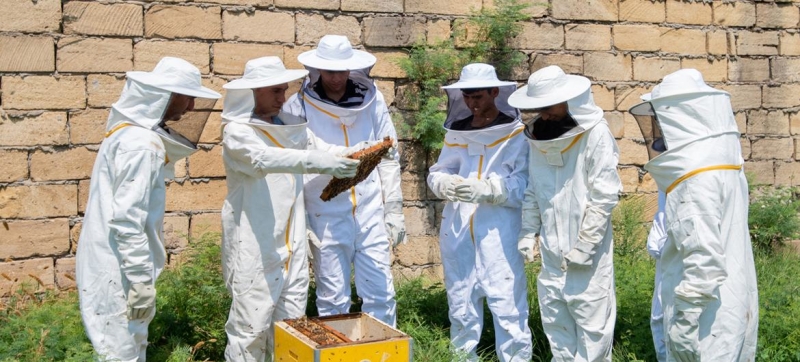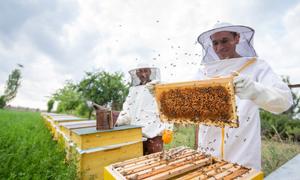
Iskender shares his knowledge through a beekeeping training program at Bilasuvar Vocational Lyceum. UN helps young Azerbaijani become a honey guru Economic development
Iskender Shiralizade’s passion for all things bees and honey began as a child in his family home in Bilasuvar, a city in southern Azerbaijan. His mother would make a variety of delicious honey-based desserts, including baklava. These homemade delicacies sparked Iskender’s curiosity about bees, the producers of this important ingredient.
“Every spoonful of honey was a mystery to me, making me think about bees and their world,” he says.
Iskender fondly remembers how his mother would buy three kilograms of honey from a neighbor every winter, and he would tell her, “One day I will keep bees and we will have our own honey.” This childhood dream laid the foundation for his future.
In his early twenties, Iskender and his mother invested in their first bee colony. The business gradually expanded, the number of hives increased, and Iskender acquired new knowledge and skills.
His mentor was renowned beekeeper Hikmet Aliyev, who taught him the art and secrets of beekeeping. He also attended several training courses at home and abroad. In Turkey, Iskender attended classes on market access and cooperative formation, where he also gained practical experience in innovative beekeeping methods.

Iskender’s real breakthrough in his career came after he completed courses offered by the Food and Agriculture Organization of the United Nations (FAO) and funded by the government of Azerbaijan. This initiative, part of the project “Increasing Youth Employment in Agriculture”, equips young men and women with the skills needed to develop agribusiness and entrepreneurship.
In a country where more than a quarter of the population is between the ages of 14 and 29, youth employment in rural areas is a major challenge. Agriculture is a very important sector for Azerbaijan, employing 36.3 percent of the workforce.
One of the main causes of youth unemployment in rural areas is limited opportunities for education and skills development, coupled with difficulties in starting a business.
“Increasing the employment of rural youth and women through training and support for agriculture is critical for Azerbaijan, helping to combat intergenerational poverty and promoting social and gender inclusion,” said Nasar Hayat, FAO Representative in Azerbaijan.
For Iskender, FAO’s support was the catalyst that transformed him from a local beekeeper into an innovator and technology guru. He developed the so-called Smart Bee Houses, which he presented at TechnoFest, a prestigious technology festival held in Turkey.
The houses are innovative devices designed to combat bee diseases and optimize honey production. Using sensors placed inside the bee house, beekeepers can monitor the humidity and weight of the hive, and track the presence of varroa mites, the worst enemy of bees, through a mobile app that alerts them if problems arise. In many cases, there is no need for physical intervention.
The FAO project also provided Iskender with the necessary agricultural equipment, including a water tank and pump to ensure a constant water supply for his bee gardens, significantly improving both the quality and quantity of honey produced. As his income grew, Iskender increased the number of hives to sixty.
“Before participating in the project, I could only produce up to one ton of honey per year, but now my production has doubled and reached two tons per year,” Iskender proudly shares.
With a wealth of international experience, Iskender wanted to teach others what he had learned.
“I want to become a mentor; I can’t keep it all to myself,” he says.
He found an opportunity to share his knowledge through the beekeeping training program at the Bilasuvar Vocational Lyceum.
Iskender currently teaches a course for aspiring young beekeepers, where he teaches them everything from the basics of beekeeping to using innovative technologies to combat bee diseases.
“Seeing young people’s passion for beekeeping makes me really happy, and I see it as my job to help them love and appreciate this work,” Iskender says.
“Every day I teach students essential skills, preparing them to become the next generation of beekeepers who can contribute to the development of the agricultural sector in Azerbaijan,” he adds.
Iskender sees great potential in his country and is eager to ensure that the next generation of youth sees it too.
When not teaching, he spends his time at home, mostly observing bees in their gardens or helping their beekeeper neighbours with their hives. Iskender says his children are now showing an interest in beekeeping too.
“My daughter Asmanur and my son Ismail love bees and bee products. They get excited every time I put on my protective suit,” he says. Although they are too young to join the family business, they love spending time on the farm: “They always ask when they can come with me to the apiary. My daughter especially, she is very eager to start.”
Iskender believes that introducing young people to beekeeping not only connects them with nature, but also opens the door to lucrative career opportunities.
